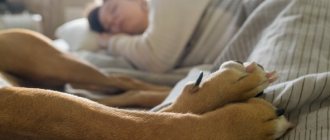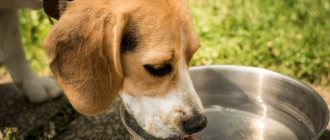Dogs spend a significant portion of their time resting regularly, and differences can be seen depending on their lifestyle and age. But if it makes us feel like our partner is sleeping longer than usual, and we find other symptoms such as lack of appetite or sadness, we may be dealing with a pathology that will require veterinary intervention.
If you've made it this far wondering why does my dog sleep so much, keep reading, we'll explain everything in this article.
My dog sleeps a lot, is this normal?
If our dog is sleeping a lot and we are wondering what it might be, the first thing to do is check to see if his sleep periods are abnormally long. Dogs usually sleep about half of their time. This does not mean that they are in deep sleep for all these hours, since they will alternate between other stages of light sleep in which they will be awake.
Posture can give us an idea of where they are in their sleep. For example, a dog lying on its side or curled up will usually sleep more soundly than when it lies on its chest with its front legs flexed.
However, how many hours a day does a dog sleep? Once the puppies are born, they will sleep for many more hours. As they get older, their sleep hours will approach those of adults. On the other hand, as dogs age, it is normal for them to spend more time sleeping and their sleep patterns change.
© shutterstock
If your dog sleeps for many hours and also falls asleep in situations where we are not accustomed to do so, he may be suffering from a disorder called hypersomnia. It appears to have a genetic basis and has been identified in breeds such as the Labrador Retriever, Poodle, Beagle or Miniature Pinscher.
Lack of entertainment
Nature instills in dogs an active lifestyle; yard dogs live like this to this day. The more active a street dog is, the more food it will have and the fewer opportunities it will have to get into a dangerous situation - you always need to be on guard. But pets, especially those who have long passed puppyhood, gradually lose their survival instincts.
At home there is always food and drink, a warm place for a restful sleep and loving owners. There is no need to hunt, sit in ambush for hours or look for a safe place to sleep. Dogs begin to get bored, and boredom causes them to eat and sleep. Such a dream is not useful, it is even harmful. Combined with an insatiable appetite, such rest will bring muscle weakness, shortness of breath, obesity and other diseases to the animal.
Do dogs sleep more in winter?
Dogs' sleep patterns remain the same with slight variations throughout the year. If our dog sleeps a lot in winter and we wonder what it could be, we can find an explanation in our own behavior.
The coldest months of the year usually coincide with unfavorable weather conditions, forcing us to spend more time indoors. When we relax at home, our dog can accompany us, spending more time relaxing. Of course, if we notice other symptoms, we may be faced with pathology.
Sleep disorders
Often, the owner may ignore sleep disturbances in his pet, considering it a temporary problem that will quickly pass. It is important to understand that sleep problems are often caused by some dysfunctions in the body. This can manifest itself as an internal disease or a disease of the nervous system. Here are the signs to look out for:
- The animal cannot lie down comfortably. This may be due to the fact that the lounger is uncomfortable for him, or he has painful sensations in the joints.
- At night, he often asks to go to the toilet, although the pet “did” its business while walking. The symptom may mean that the dog has a cold in the kidneys.
- A sharp jumping up of a shaggy friend in a dream. This is often seen in young and energetic dogs that have been running around too much while out walking. In this case, reduce the intensity of physical activity.
- If an elderly dog wakes up several times at night and goes to the bowl to eat, then this is, in principle, normal. However, if this is accompanied by food aggression or the fact that a new pet has appeared in the house, then measures need to be taken. Also, to ensure your dog sleeps peacefully, you can carry out therapy against parasites such as worms or give him mild sedatives.
The dog sleeps a lot in summer
And if our dog sleeps a lot in winter, this is normal, the same thing happens in summer. It's no surprise that during months with warmer temperatures we notice the dog sleeping a lot in the heat. Additionally, it usually sits in cooler areas such as bathrooms or kitchens with tile floors. A typical pose is one where the stomach is in contact with the ground.
In these cases, we will notice the most active dog in the morning and late afternoon, which coincides with cooler hours. It is also possible that dogs eat less in this situation. Again, the finding of other symptoms could be a manifestation of pathology.
Factors influencing the sleep duration of a four-legged animal
Age
Puppies and older dogs spend much more time sleeping than healthy and young dogs. Puppies need more time to sleep because they grow while they sleep. For example, three-month-old babies can sleep up to 20 hours a day. Older dogs need more time to recuperate.
Breed
Representatives of large breeds also require more time to recuperate.
Weather
Just like people, weather conditions also affect our dogs. Probably every owner of a four-legged dog has noticed that on a cloudy and rainy day his pet becomes lethargic, sleepy and prefers to curl up, lie in a soft bed and snore quietly and peacefully in two holes.
Stress
The duration of sleep is often greatly influenced by stress. After the experience, the dog can sleep for a whole day. For example, our Jack, after exciting trips to the veterinary clinic, even for the usual annual vaccination, sleeps for half a day and comes to his senses.
Disease
Very often, when a dog is unwell, he may sleep longer than usual. Watch your pet. If, in addition to lethargy and weakness, other symptoms are observed (such as diarrhea, vomiting, lack of appetite, and so on), then in this case you need to seek help from a veterinarian.
Boredom
If household members are at work all day, and the four-legged one is left at home alone, then he simply has nothing left to do but sleep.
It’s another matter if the dog lives in the yard or when the family is full of children, a cat and other animals. There's no time for sleep here anymore. There's a whole bunch of things to do. Chase a cat, run after a ball with children, bark at neighbors or other people's dogs passing by. What fun! How boring it is!
Estrus
During estrus, the duration of sleep for young ladies increases. They become calm and even a little sad.
The dog is older and sleeps a lot
Another situation in which a dog's sleep time may be increased physiologically is in old age. In these cases, if our dog sleeps a lot and we are wondering what it could be, the answer may lie in cognitive dysfunction syndrome. It is a brain disease similar to Alzheimer's disease in humans.
Affected dogs show changes in their behavior and may urinate in the house, become disoriented, exhibit stereotypical behavior, or suffer from sleep disturbances, so they sleep more during the day and less at night. You should go to the vet because before diagnosis it is important to rule out other diseases that are also common in older dogs.
© shutterstock
Weather influence
Another important reason for long sleep is the weather. Our smaller brothers react to climate changes even more strongly than we do. For example, in hot weather, dogs try to hide in some secluded corner where it is cool and even damp. At this time, they become lethargic, lose their appetite, try to sleep more or lie with their eyes closed in a doze.
The same behavior is observed in some dogs during prolonged rains (lethargy, loss of appetite, sleep). In this situation, much depends on the individual characteristics (climatic preferences) of your pet.
The dog sleeps a lot and is sad
If our dog sleeps a lot, it may be due to a psychological problem. If a dog sleeps a lot and is sad, although a physical cause should always be ruled out first, we cannot forget that it is possible that he is experiencing a depressive picture. A dog that sleeps a lot and doesn't play as usual may feel discouraged by boredom, isolation, loneliness, inattention, sudden and frequent changes in its daily routine, etc.
Additionally, if our foster dog sleeps a lot, it could be a result of abuse or early separation from his mother. There are also genetic causes, although they are in the minority. These dogs, in addition to being lethargic, will be lethargic, unresponsive, or unresponsive to interesting stimuli. They will need veterinary treatment to first diagnose and rule out physical causes, and then change the pet's daily routine and living conditions.
Stress
All animals react differently to stress. Some become aggressive, others become apathetic. Some people start eating everything, and there are dogs who refuse to eat at all. Often the reaction to stress is deep, prolonged sleep. In this way, the body is restored and the animal gains strength.
Do not forcefully wake up your pet and force him to eat or drink. The dog instinctively understands better than you what it needs now, and will take food when its body needs it.
The dog sleeps a lot and vomits
Finally, if our dog sleeps a lot, it could be due to poisoning. Ingestion or contact with toxic substances can cause a clinical picture that causes the dog to become drowsy and even in shock. If the dog sleeps a lot and trembles, has nervous tics, vomiting, diarrhea or neurological disorders, we should immediately consult a veterinarian, as we may face intoxication. Treatment is necessary and the prognosis remains unchanged.
Author of the article : Maria Besteiros.
When should you contact a veterinarian?
Dr. Potoski says, “I would recommend taking your dog to the vet if he becomes extremely lethargic. Anything that goes beyond her usual behavior should alert you and be a reason to visit a specialist.” As a dog owner, you are the best person to tell what dog behavior is normal and what worries you. When you see changes that are concerning, consult your doctor!
No wonder they say that a dog is man's best friend. Many of us love them as much as we love family members, and taking care of their health is just as important. This is another reason to find out how long dogs should sleep.
Found a violation? Report content
Stages of sleep in dogs
The sleep structure of dogs and humans is identical, except that the duration of the periods is different. At each stage, the brain experiences stress, and certain processes occur in the body. Sleep is usually divided into several types:
- Napping - the animal is fully conscious, controls the situation, but behaves relaxed. This stage is considered as a temporary rest to recuperate or the first stage of falling asleep.
- Shallow – active tissue repair processes are launched in the body, the dog is completely relaxed, but can hear sounds around him.
- Deep is the only stage of complete muscle rest. Typically, at this stage, you can see the dog moving its lips or twitching its paws.
- Fast is a relatively recently discovered stage. At this stage, the dog is completely motionless and relaxed, but you may notice rapid movement of the eyeballs. After REM sleep ends, the dog either wakes up or falls back into light sleep. By the way, a person remembers his dreams in detail if he woke up immediately after the REM stage of sleep.
Important! Deep sleep is the only state of the body when the immune system works at full strength.
Sleeping place: rules of choice
If you're determined to stop your dog sleeping in your bed, you'll need to make an effort to create a comfortable sleeping area for your dog. If you spend enough time observing and choose a comfortable bed, you can be sure that the dog will not break the rules of behavior even in the absence of the owner.
You need to start by choosing a comfortable lounger. In order to understand what type of bed your dog needs, you need to watch your pet sleep. The main factor you need to pay attention to is your usual sleeping position. Most often, dogs like to stretch, curl up, or change positions frequently while sleeping. In the first and third cases, a rectangular-shaped lounger is suitable, in the second, a round or oval basket.
Important! For older dogs that suffer from arthritis or other musculoskeletal ailments, it is necessary to choose a spacious bed with a quality mattress.
When choosing a dog bed, pay attention to the quality of the product. It is not recommended to buy sun loungers covered with synthetic fabrics. It is best to choose a lounger with a removable cover that is easy to wash. Carefully inspect the lounger for staples and nails that are sometimes used to hold the frames together.
If you want your dog to sleep in his own place and not try to climb onto your bed, the bed should be located outside the bedroom. Make sure that the lounger is not in a draft! During the training process, the dog may refuse to be on the bed if it is located in an unsafe (in its opinion) place.
Note! In order for the dog to understand that the new bed is its property, it is necessary to place a basket with toys nearby. Your old sweater or shirt, which can be used to cover the bed, will help make it easier for your pet to get used to it.
If you are training a puppy or a very emotional dog, you can use a spacious box or crate as temporary shelter. The bottom line is that the shelter must have a roof. Generally, dogs feel more relaxed when the bed is dark.
What should you do if your dog sleeps on the bed when you are not looking?
Common situation! There are many options for behavior correction. All of them are based either on limiting the territory or on neutralizing interest.
Newspapers instead of a bedspread
The rustling paper will be enough to scare the most delicate pets. Just spread crumpled newspapers on the bed. When jumping, the dog will hit an “unpleasant” surface and will prefer to retreat. However, many will prefer to frolic and cause chaos.
Rustling polyethylene
Purchase durable film from a greenhouse store. Make the bed with it. The polyethylene rustles loudly and is unpleasant to lie on. In extreme cases, it will protect the surface from wool and dirt.
Kuznetsov applicator
One of the surest ways. The applicator is a small mat with plastic spikes. The device is used for health procedures, but with its help you can also get rid of a bad dog habit. The thorns will not damage the delicate paws, but will force you to go in search of a more comfortable place.
Scat mat
A small transparent mat that allows a light discharge of current to pass through when touched. Perhaps this method may seem cruel to some, although in reality it instantly stops the fight for furniture. The discharge is non-lethal and weak, solely for discomfort.
Closed door
Sometimes this is the only acceptable measure. It is not always effective, but with an integrated approach it can give results.
Gastrointestinal disorders
Sometimes weakness and lethargy is caused by a decrease in blood sugar. Hypoglycemia often occurs in puppies under 4 months of age. This is due to the large consumption of glucose by the growing puppy’s body. Infections, weather changes, and stress cause a decrease in blood glucose. The puppy develops pale gums and mucous membranes, weight loss, bad breath, and poor appetite. With significant hypoglycemia, the animal often experiences convulsions and gait disturbances. During the examination, the veterinarian will take a blood glucose test. The normal level is above 3.5 mmol/l, but this condition is also caused by diseases of the endocrine or digestive systems. Treatment depends on the identified cause of the disease.
Puppy drowsiness is caused by pathologies of the stomach and intestines, when appetite decreases, digestion is disrupted, nausea and vomiting appear. Dogs, like people, have congenital defects in the production of enzymes involved in digestion. Due to malabsorption, less nutrients enter the bloodstream and the animal becomes lethargic. Such a dog needs a diet and special enzymes.
Poisoning from accidentally eaten poisons, toxic detergents, or low-quality products also causes symptoms of intoxication: lethargy, drowsiness, apathy. The puppy develops nausea, vomiting, and bowel movements. Intoxication is relieved by intravenous administration of solutions.
The puppy's passivity may be due to insufficient nutrition and poor food. A growing dog needs to eat plenty of protein, carbohydrates and fat. Without multivitamins and microelements, an animal will not be able to grow and develop properly.
Loads and general “atmosphere” of the environment
When a dog has nothing to do, it eats or sleeps. In principle, this axiom is true for all living beings. If we consider a young and healthy pet, then the duration and quality of sleep will greatly depend on the loads received. A tailed dog, bored within four walls, dozes most of the day, a dog that has been walked and tired sleeps in a long and deep sleep. The conclusion is obvious - for the full functioning of the body, maintaining health and psyche, the dog must receive exercise and sleep, albeit not for such a long, but deep sleep.











